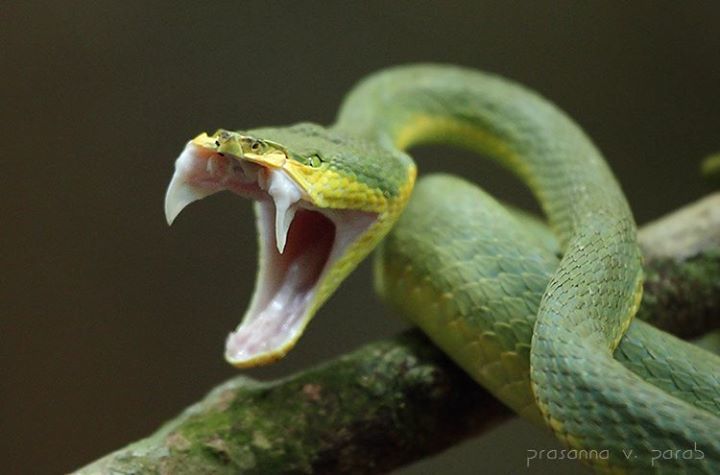Snakes have a natural resistance to their own venom, as well as venom from snakes of the same species. Their immune systems naturally produce structures similar to those found in anti-venom, which block the venomous particles from harming cells.
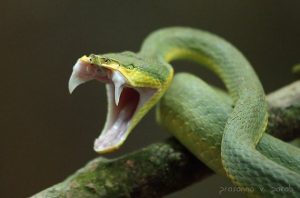
Snakes have long teeth called fangs. Some snakes have poisonous venom in their fangs, which can kill their prey.
While you probably have a solid understanding that venom can cause us harm or even be lethal, you may have wondered whether a venomous snake can die if it encounters its own venom. If it can kill other reptiles, why would it be different for itself?
What is snake venom?
Venom is a fluid produced in the mouth glands of snakes.
Its main role is to immobilise prey, or simply for defence against other snakes. Venom is made of small protein particles which latch onto cells and disrupt their function, as well as killing them.
Some of these proteins are even able to break down tissues, to make a snake’s digestive process easier. These proteins are what make venom so harmful to humans and other animals.
Most venoms only harm humans when bitten or stung deeply into tissue, rather than just on the surface of the skin. Its attacks can range in severity from inflammation of the skin around the bite, up to almost immediate death. What should you do if you are bitten and fear you have venom inside you? The answer is a dose of anti-venom.
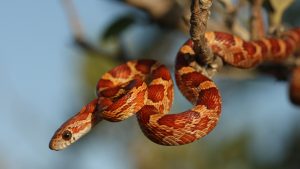
What is anti-venom?
Anti-venom is similar to venom in that it is made of small protein particles.
Typically, if you encountered less harmful venom from smaller creatures like wasps, your body would naturally produce small proteins called ‘antibodies’. These antibodies attach to the venomous proteins, meaning they can no longer latch on to cells and harm them.
However, snake venom is too strong for most antibodies. The body takes too long to produce the necessary antibodies before the venom can greatly harm your cells. To combat this, anti-venom is given. This contains artificial antibodies to stop the venom from working.
You may have heard the term ‘antibodies’ in talk about vaccines. These are based on a similar principle. The antibodies latch onto viruses to prevent them from entering cells and causing harm to the body. Vaccines can give long term protection. However, a difference between vaccines and anti-venom is that if someone is re-bitten by the same snake, they will not be immune to its venom.
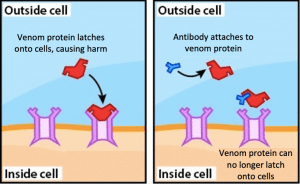
How do the snakes become resistant to venom?
So, if humans require antibodies to survive snake bites, why do snakes undergo no harm from their own bites?
Obviously, the bite itself causes harm from loss of blood. But venomous snakes are resistant because their immune systems naturally produce the antibodies necessary to suppress their own distinct venom. Since the production of venom is coded into the snake’s DNA, all snakes of a species produce the same venom, and therefore the same antibodies.
This means that if a snake bites and injects venom into a snake of its own species, the only harm will be from the bite itself. However, if a snake bites a snake of a different species, it would cause the same effect as if the other snake was human.
If a snake were to bite itself, antibodies would quash any venom injected into the blood. They bind to the venomous protein particles, forming harmless pieces of protein which are ejected by the kidneys.
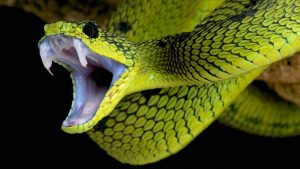
Snakes have evolved so they can bite their own tails but cannot poison themselves.
Animal-Club provides animal parties or animal handling workshop where your will be able to see, learn and interact with the hamsters and other wonderful animals with the help of our presenters. Our mobile zoo has many friendly animals such as rabbits, tarantulas, geckos, vinegaroons and more that will be perfect for an animal party. We can also come over to your school for an animal school visit or arrange for an animal workshop with us where the children can learn about animals and have fun too.



